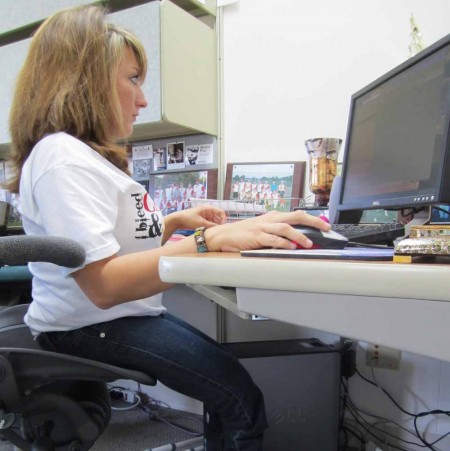
Sacral Agenesis is a disability that one in 25,000 people get. It’s a rare disease where a person’s spine does not develop the way it should. The spine can have many curves, and the tailbone can even be completely missing.
For Melissa DiVietri, a junior in the New Media Print Management program, dealing with this disability is a part of her daily routine.
“It has been a long journey, but the disability is not overcoming me, I’m not going to let it beat me. I’m going to continue to improve week by week, month by month, and year by year,” said DiVietri. “I was in a wheel chair for a long time. Through surgery and physical therapy, I was able to overcome that and I am now on crutches.”
Before DiVietri chose to attend Ferris State, she contacted the disabilities services office to make sure Ferris was a good fit for her.
“I wanted to make sure that I would have the necessary accommodations before I came. The department blew me away with how sophisticated they were,” said DiVietri. “My biggest worry was to be able to get around campus, but they provide things like snow removal and they make sure your classes are always manageable to get to. Anytime I need help, it’s right there on the fly. It’s just enjoyable to have support from the university.”
Although DiVietri may have to do some things differently than other students, she does not let her disability get in the way of her potential of being a student leader around campus.
Not only has she been part of Bulldog Radio in the past, she participates in Student Alumni Gold Club, works for the university updating the website, and is also a Student Ambassador.
“I do tours every Friday, so I’m interacting with between 30 to 60 students and their families every week for the first time. Sometimes that’s a shocker because not a lot of families have ever been around someone with a disability, especially someone who is comfortable with it and positive about it,” said DiVietri. “At the end of the tour, it’s like they have just dropped the barrier and they don’t even see the disability anymore, they are looking directly into my eyes. It’s a great feeling.”
Throughout the many challenges and obstacles DiVietri has faced, she has kept one opinion for others close to her heart — she just wants people to ask.
“I would just be happy if someone would actually ask instead of stare. That’s my biggest thing; if you just ask, I will educate you on it. I want people to know and to be more diverse, I want them to be open to having these kinds of surroundings. I share some of my experiences on a blog, and I think people could learn a lot about it from reading those,” said DiVietri.
She added, “Everyone comes from a different background and you don’t know what someone has gone through until you actually sit down and talk with them. For me, my disability has made me the person I am today.”
